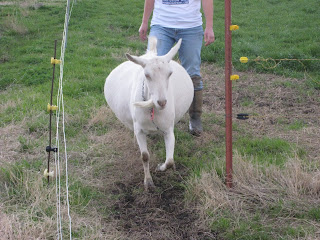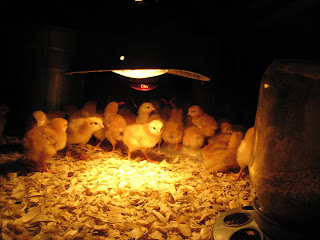Two weeks ago we had a group of students from UofM come for their spring break (you can barely call it 'spring' as it always starts in February).
 As an alum, I took them under my wing and showed them 'the ropes'. I taught them how to lasso, hold rabbits, and I learned how to balance things on my chin (thanks Ares). I must say, they had the exact same reactions with every thing that they witnessed as my group did when we came before. There is a whole program we do called 'living on the other side' with groups that come for a weekend or more. Note: for most people, coming out here in the first place is considered the 'other side'. Some of the events we do include the 13 cent breakfast (in which you have 13 cents to buy breakfast with and the prices go up based on demand), dinner on the other side, and a hunger banquet. Dinner on the other side is supposed to simulate what it would be like to cook in a third-world country. The group has to walk half a mile to get water and wood, work for the vegetables (usually picking a vegetables for the farmer before they get to keep some for their meal), and killing and skinning a chicken if they want meat with their meal.
As an alum, I took them under my wing and showed them 'the ropes'. I taught them how to lasso, hold rabbits, and I learned how to balance things on my chin (thanks Ares). I must say, they had the exact same reactions with every thing that they witnessed as my group did when we came before. There is a whole program we do called 'living on the other side' with groups that come for a weekend or more. Note: for most people, coming out here in the first place is considered the 'other side'. Some of the events we do include the 13 cent breakfast (in which you have 13 cents to buy breakfast with and the prices go up based on demand), dinner on the other side, and a hunger banquet. Dinner on the other side is supposed to simulate what it would be like to cook in a third-world country. The group has to walk half a mile to get water and wood, work for the vegetables (usually picking a vegetables for the farmer before they get to keep some for their meal), and killing and skinning a chicken if they want meat with their meal. The stove they cook on is called a Lorena Stove, an improvement on the 3-rock stove in which a pot is balanced over 3 rocks. Something that they find out is how the smoke builds around the stove, a common problem in the third-world. Dinner starts around 2:30 and is usually done by 6. It shows how important food is to those who don't have it readily available. The hunger banquet is a simulation where a three caste system is used to represent the upper, middle, and lower class of the world and the type of food they eat. The upper class gets spaghetti, meat sauce, juice, tea, coffee, clean water, fruit, and ice cream, the middle class gets beans, rice, and semi-clean water, and the lower class gets a few spoons full of rice and dirty water. 60% of the world falls under lower class, 25% falls under middle class, and 15% falls under upper class. It's a very visual way to see how the world is divided. It's also fun to see how far people take the simulation meaning who eats immediately afterward and who waits until the next meal in continuing with the simulation.
The stove they cook on is called a Lorena Stove, an improvement on the 3-rock stove in which a pot is balanced over 3 rocks. Something that they find out is how the smoke builds around the stove, a common problem in the third-world. Dinner starts around 2:30 and is usually done by 6. It shows how important food is to those who don't have it readily available. The hunger banquet is a simulation where a three caste system is used to represent the upper, middle, and lower class of the world and the type of food they eat. The upper class gets spaghetti, meat sauce, juice, tea, coffee, clean water, fruit, and ice cream, the middle class gets beans, rice, and semi-clean water, and the lower class gets a few spoons full of rice and dirty water. 60% of the world falls under lower class, 25% falls under middle class, and 15% falls under upper class. It's a very visual way to see how the world is divided. It's also fun to see how far people take the simulation meaning who eats immediately afterward and who waits until the next meal in continuing with the simulation.On Thursday we had a class on cropping systems. There are a lot of variables that go into selecting which crops to plant and if you want to intercrop. Some factors include soil texture and physical properties, drainage, weather patterns, and day length. Depending on what you are planting it may require soil that drains quickly as not to drown it or need more sunlight (the latitude determines the length of daylight and seasons). Intercropping is having more than one crop in a small area that work to complement each other. For instance, corn takes up a lot of nitrogen and peas (legumes in general) are nitrogen fixing (meaning they take nitrogen out of the air and store it in their roots for later use). As the peas grow, they can also climb the corn stalk allowing for more surface area to be exposed to sunlight. There are all sorts of combinations that can be done. An interesting concept we learned about is relay planting. This involves planting something, letting it grow, killing it, and then planting new seeds immediately to use the nutrients left behind by the previous plant. This causes the second plant to grow faster than it would otherwise due to the extra nutrients. Several intercropping methods include alley cropping and SALT systems. Alley cropping uses the space in between larger plants, or the alley, as room for smaller varieties that will benefit from falling leaves. SALT stands for sloping agricultural land technology. This deals with how wide rows should be to account for sloped surfaces. If you're planting on the side of a hill and it rains, if your rows are too wide, the soil can become loose and slide without being stopped. SALT includes making buffers to stop these slides by using other plants to catch the land behind it. Intercropping on the whole can help to prevent pests and disease by dispersing any single type of plant and essentially hiding it among other varieties and can reduce soil erosion as different plants have different amounts of and sizes of roots.
This last weekend my stepbrother Danny got married. I must say, it was pretty exciting to be at a non-orthodox Jewish wedding. We did the hava nagila but nothing more....and there was mixed dancing. I wish him and his wife the best.
This next week we have a group coming from the University of Texas - Dallas. I hope this group is as much fun as the Michigan group was. I'll leave you with this thought: If any animal deserves a wide load sign it's one of our goats, Phoebe. She recently kidded but pre-kidding this is what she looked like.

Farm Day is coming up! This is essentially an open house where a lost of the locals come and visit. There's hay rides, bands, and speakers all day. This would be a good time to visit if you're close by and wanna come. It's on April 10th.



